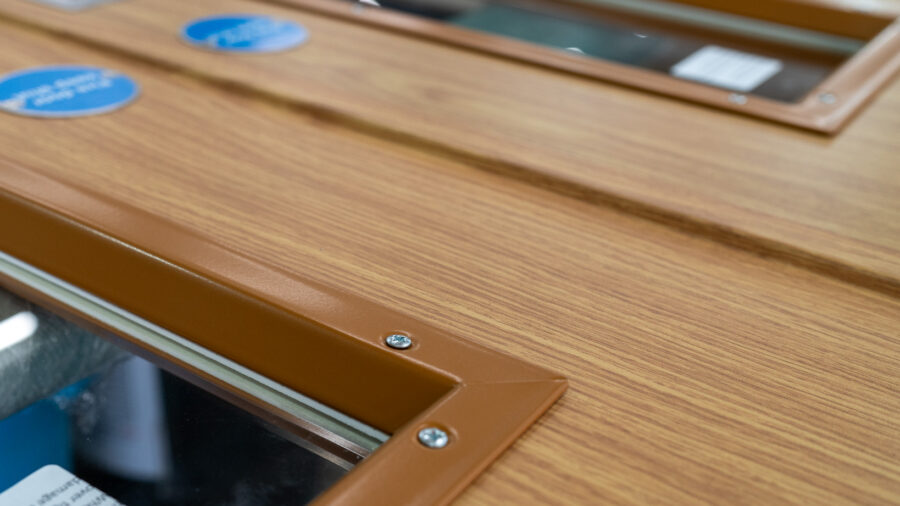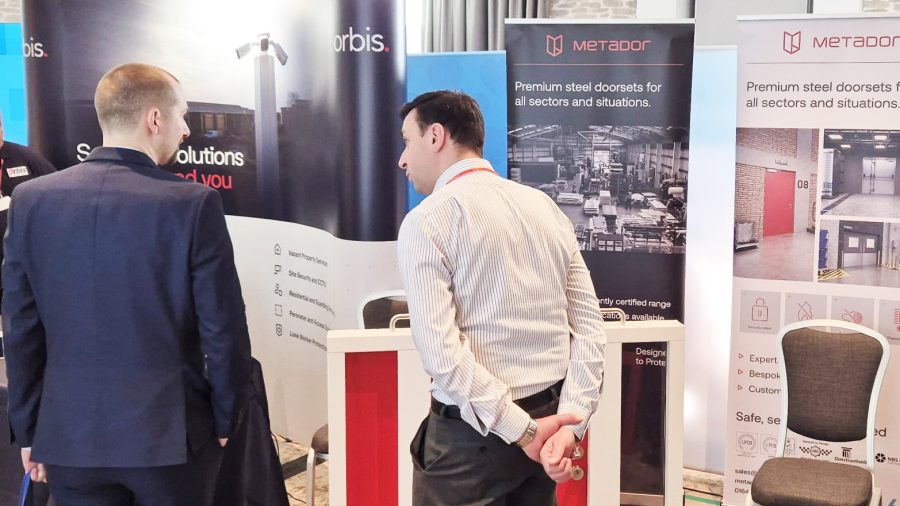Steel door sets offer a secure and functional solution for many different workplace environments. They are extensively used as both external and internal doors in office buildings, hospitals, warehouses, education, retail and leisure. What many potential buyers may not be aware of is the variety of different steel door types and the uses suited to each one. Many people are surprised at how ubiquitous and common, steel doors are.
This industry is enormous with a market sector of about £300m in the UK alone and truly an industry in its own right, with businesses devoted exclusively to designing and manufacturing steel doors. This article offers a brief buyers’ guide aimed at business purchasers looking to equip their premises with steel doors. It is important to be aware of the type of door you need for your facility or business in order to make sure you can select a door that is fit for purpose.

When to Use a Steel Door Set
There is a traditional misconception about steel door sets that they are invariably ugly, expensive and extremely heavy; giving a building the look of a military compound or bunker. While there may have been a modicum of truth in this once, steel door construction techniques have moved on significantly since. Modern steel door sets are available in a wide variety of styles and can be designed to blend in with the style of the building concerned.
These concerns are going to be at the forefront of the mind of any building owner, especially when it comes to commercial premises. The presence of valuable computer equipment, customer data and other property make offices vulnerable to break-ins and theft. At the same time, multiple electric ports, high-temperature IT suites and the strong possibility of human error in an office setting make fires more likely, and more damaging than they would be in a domestic environment.
For these reasons, a buyer should consider fitting steel door sets on areas vulnerable to fire or intrusion. These may include generator rooms, server rooms, external fire exits, kitchens and so on.
Different Steel Door Sets for Different Purposes – What You Need to Know
This may appear to be an obvious question, but there is a lot more that goes into steel door manufacturing than simply welding some rectangular slabs of metal together. Manufacture of such a product requires highly accurate precision engineering to include both the frame and the door blade, handles, locks, closers, vision windows and so on. The doorset then is usually finished in a colour powder coat or paint finish.
Then there is the type of steel to consider, the strength of the door and the insulation value. The choice of which will depend on what you need to use the door for.
A number of different metals are used depending on the purpose of the door. The four most common types are as follows:
- Cold rolled steel: The most common form of steel that was used extensively historically in the manufacture of industrial doors. Cold rolled steel is only really suitable for internal use as it is untreated by any coatings. It can easily be painted to match a building’s interior decor, but it has very poor rust resistance. Cold rolled steel can be adapted to most forms of doors, and was commonly seen in very industrial environments up until the 1990’s.
- Galvanneal or Zintec steel: This steel provides an average level of corrosion resistance with good paint adherence, providing a high quality primer is used before painting. Galvanneal and Zintec are a carbon steel with a coating of iron-zinc alloy to give it its distinctive characteristics. It is available commercially in different grade qualities. It must be borne in mind that even if this product is painted or powdercoated, any surface damage will initiate the corrosion process with rust soon appearing.
- Galvanised steel: This is the ultimate material used in the steel door industry by the better manufacturers. Galvanised steel is manufactured from carbon steel with a full hot-dip zinc alloy coating. This material has high rust-resistant properties and the surface is usually powdercoated with a polyester powdercoat or marine grade powdercoat to enhance corrosion resistance and giving the product an excellent finish. Even if the powdercoat finish is scratched, the surface of the galvanised sheet is rarely damaged thus preventing corrosion ingress.
- Stainless Steel: This steel is often used in prestigious city buildings where a highly decorative finish is required or in highly corrosive environments where other steels would be inappropriate.
Door Strength
Door skin thickness is an important criteria for consideration if security doors are required. Door skin thicknesses are typically 1.0mm, 1.2mm, 1.5mm, 2.00mm, 2.5mm and 3mm. The door manufacturer will be able to advise you on this criteria when they know what level of security you require. Bear in mind that doors manufactured from a 1.5mm skin are approximately 56% stronger than those manufactured from a 1.2mm skin and a 3mm skin door is approximately four times as strong as a 1.5mm skin door. Door strengths are dependant too upon the internal core and ironmongery used.
Door Leaf Cores and Insulation
- Light- Medium security levels – Door leaf cores are made in different ways depending upon the supplier or your requirements. Obviously, if you don’t require a door to withstand abuse or attack, a cardboard honeycomb core maybe all that you need. These doors are cheaper to produce and lighter to install. The typical U value insulation value of this type of door is approximately 2.5 Wm²K – 3 Wm²K.
- Medium – High security levels – Other cores used in steel doorsets are steel strengthening channel, which is adhered to both internal surfaced during manufacturing and then filled with mineral wool slab insulation. This type of core is used on medium to high level security doors also with the benefit of giving a U value of 1.8Wm²K
- High – Extra-high security levels – Core design on high to extra high security doors contain timber, anti-drill sheet or other materials. Security levels required will determine the materials used.
Door Ironmongery
Ironmongery – the handles, locks, closers and hinges on a door all add to the integrity and security of a steel door. There are huge amounts of options available from the cheaper far-eastern options to the high security European products – all achieving different levels of security, suitability and longevity.
Concluding Thoughts & Where to Buy
Purchasing steel doorsets is an important investment decision and one that a buyer needs to take seriously. It is imperative to select a door set that is fit for purpose and that will give you many years of use. A careful choice will pay dividends in security, peace of mind and value for money. Steel doors are available in all different sizes, to fit all sorts of apertures, buildings and industries. These range from modest ‘off-the-shelf’ products to bespoke doors for specialist functions.
A thorough knowledge of the market and familiarity with the different terminologies associated with steel doors will be a great asset in choosing the correct door to suit your premises. However, unless you are sure that you know exactly what you require, it is advisable to speak to a specialist manufacturer to help you.
If you would like to discuss your specific project with one of our experts, without obligation, simply complete the form below and we’ll be in touch shortly. We look forward to hearing from you.


